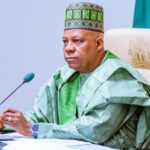With moves by the monetary authorities to unify the Naira foreign exchange (forex) rates gaining traction, economic analysts believe that the step may impact positively on the economy if the increased naira inflow into the federation account is judiciously utilized by the tiers of government.
In addition, experts also pointed out that if efficiently managed, the policy step will make the cost of doing business cheaper, attract more investments into the economy as investor confidence will become stronger and add impetus to the ongoing economic diversification of the government, amongst other potential benefits.
It was widely reported on Wednesday that, following the CBN’s policy stance, the Naira traded at N381.
Based on this, dealers cannot bid bellow this threshold, effectively devaluing the naira.
Commenting on the monetary policy stance, Prof Uche Joe Uwaleke, a Professor of Finance and Capital Market at the Nasarawa State University, Keffi, said “it translates to increased naira inflows into the federation account implying that the three tiers of government will have more money to distribute.
Also, It eliminates opportunities for currency round-tripping and sharp practices associated with having multiple Exchange rates.”
He further noted that “it will enable price discovery as the real value of the naira becomes established through demand and supply forces as not a few think that the naira is overvalued.
Similarly, it will engender clarity in the country’s forex market with the potential to attract foreign investors.”
Uwaleke however warned that “abolishing the official Exchange rate and leaving the fate of the Naira entirely to market forces has grave implications for an economy having a single product, crude oil, as 90 percent source of foreign exchange.”
An economist and former Director General of the Abuja Chamber of Commerce and Industry (ACCI), Chijioke Okechukwu, said: “The rate adjustment is to be able to have a higher revenue base to fund the budget, stressing that the more the devaluation, the higher the naira revenue for the country.”
An Abuja-based financial expert, Leman Aliyu, said removal of foreign exchange restrictions and a full exchange rate unification would help keep the parallel market premium in a sustained manner.
According to Aliyu, it will help Nigeria move towards a more diversified economy.
The Director General of Lagos Chamber of Commerce and Industry (LCCI), Dr. Muda Yusuf said that it is imperative for the exchange rate to reflect the market fundamentals in order to ensure sustainability and promote efficiency in allocation mechanism.
This he said is critical for investors’ confidence.
According to the Executive Secretary, Association of Power Generation Companies (APGC), Dr. Joy Ogaji, the unification of the forex may have a lot of impact on bringing down the funds expended on power generation inputs, especially gas.
She said: “We have been bearing the forex loss from inception till now.
“With the current change, we believe the burden is more especially on the concessionaires who pay their fees in dollars to Government.”
Commenting, the National President of National Association of Small and Medium Enterprises (NASME) Prince Degun Agboade, said that “if dollar has not been available and they now say at N381 it will be available, let them give us because some of us that need even $500 to buy spare parts abroad.”
The Chief Executive Officer of Aglow Aviation Support Services, Mr. Tayo Ojuri said the development might not have much impact on the aviation sector unless the reduction was backed by regular funding.
Financial experts said the latest moves by the CBN aligned with the position of the fiscal authorities on the unification of the exchange rate as stated in the letter of intent sent to the International Monetary Fund (IMF).
In the letter, the federal government stated it would work towards “full exchange rate unification and greater exchange rate flexibility” to help preserve foreign exchange reserves and avoid economic dislocation.

 Join Daily Trust WhatsApp Community For Quick Access To News and Happenings Around You.
Join Daily Trust WhatsApp Community For Quick Access To News and Happenings Around You.


